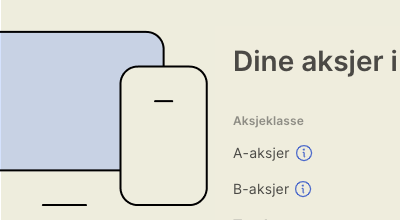The chairman of the board is elected by the general meeting if the board does not constitute itself or the company has a company assembly, cf. Section 6-1 second paragraph of the Companies Act. If the board constitutes itself, the chairman of the board is elected by and among the board’s members. If the board has only one member, that person is considered the chairman.
If the company has a works assembly, the chairman of the board is elected by the works assembly, cf. Section 6-1 third paragraph of the Companies Act.
You can choose the chairman and other members of the board as part of an automated process on the dCompany platform.
Do you want to organize board meetings, decisions, reporting and documents in one place?
dCompany is everything you need for board work
-

Archives
Smart and secure archiving An archive that updates itself When you use dBot to create notices or minutes from board […]
-

Board portal
Effective and professional board work With the board portal, you can easily and efficiently generate notices and protocols. The board […]
-

General Assembly
Complete general meetings in minutes. dCompany automates notice, proxies, attendance registration, voting, minutes and signing.
-

Powers of attorney
Complete solution for creating, sending out, issuing and registering powers of attorney digitally. You also don’t have to count up when registering attendance and during each case.
-

Shareholder pages
Make shareholders self-service with individual shareholder pages The shareholder pages give each shareholder a full overview of their own shares, […]
-

Signature
User-friendly digital signing at the highest level of security Send protocols for signing quickly and easily dCompany allows you to […]
Chairman’s duties
The chairman of the board naturally has a special responsibility for the board’s work, including the organization of this. The board has a responsibility for the management of the company and a responsibility for supervising the day-to-day management and operations in general (the so-called administrative responsibility and supervisory responsibility).
As the name suggests, the chairman of the board is responsible for leading the board and its work. The Swedish Companies Act also has certain provisions that assign special duties to the chairman of the board. As regards the board proceedings, this includes the following:
- The chairman must ensure that relevant matters that fall under the board’s purview are dealt with, cf. Section 6-20 of the Companies Act.
- The managing director must prepare matters for the board meeting in consultation with the chairman of the board, cf. Section 6-21 of the Companies Act.
- The board must deal with matters in a meeting, unless the chairman of the board finds that the matter can be submitted in writing or dealt with in another way, cf. the Companies Act § 6-19 first paragraph. The treatment must be reassuring.
- The chairman of the board must ensure that the board members can, as far as possible, participate in a joint treatment of the matters being dealt with, cf. the Companies Act § 6-19 second paragraph.
- If a matter is to be dealt with in a meeting, the chairman of the board determines the meeting format, cf. the Companies Act § 6-19 second paragraph. More than half of the board’s members can still demand that the meeting be held as a physical or electronic meeting.
- The board proceedings are led by the chairman, cf. the Companies Act § 6-19 third paragraph. If neither the chairman nor the deputy chairman participates, the board elects a chairman for the board proceedings.
- By virtue of being chairman of the meeting, the chairman of the board has a so-called decisive vote in most cases in the event of a tie. This means that in cases of equality of votes, what the chairperson has voted for applies, cf. the Companies Act 6-25 first paragraph. However, certain special rules apply to elections and appointments, see Section 6-26 of the Companies Act.
A secure solution for your companies

Data storage in Norway
That all data is stored safely in Norway means that your data remains subject to the strict privacy and data protection laws that Norway has.

Secure access control
Only authorized users have access to your documents and data. This ensures that your trade secrets and confidential documents do not fall into the wrong hands.

Encryption of your data
Encryption ensures that your data, both personal information and sensitive business documents, is protected against unauthorized access, alteration or deletion.

Automatic safety monitoring
The solution in dCompany is continuously monitored for any threats or breaches of security. Any deviations are quickly identified and dealt with to ensure that the data remains safe.

Backup and recovery
Automatic backups ensure that you never lose valuable information. You can quickly restore to an earlier version of your documents if necessary.

E-signature at the highest level of security
Electronic signing with BankID is the easiest, safest and fastest way to sign.
The chairman has the following special duties vis-à-vis the general meeting:
- If the general meeting is held as a meeting, the chairman and general manager must attend, cf. Section 54 of the Companies Act. If the general meeting is held as a physical meeting, the chairman and general manager must attend physically.
- The chairman of the board opens the general meeting, unless the board has decided to elect someone else to do so, cf. the Companies Act § 5-12 first paragraph.
- When conducting a simplified general meeting, the minutes from the general meeting must be dated and signed by the person who is the chairman of the board at the time of signing or by the person appointed by the general meeting, cf. the Companies Act 5-7 a. third paragraph.
- In the event of a notice of dissolution, any objections during the creditor period must be reported to the chairman of the board no later than six weeks after the announcement of the notice, cf. Section 16-4 of the Companies Act.
Safe and efficient management of portfolios

Manage shareholder books across companies and national borders
dCompany connects the company’s own data
publicly available owner data and gives you a full overview of the group or portfolio – across countries

Eliminates entering the same information in multiple places
If you have used dBot to make a decision, the platform will automatically update both the articles of association and the shareholder book.

Get full control of upstream and downstream ownership
Control of ownership is important for all companies, and especially for companies with many shareholders, structures and for advisers with client portfolios
What dCompany can help the chairman of the board with
dCompany digitizes the limited company, and many directors want just this: a digital limited company.
The chairman of the board naturally has a special responsibility for ensuring that board meetings and general meetings are held in accordance with the law and is documented in the correct manner. With dCompany’s meeting function, the chairman can call board meetings and ensure that all board members have access to all documents in a simple and safe way. In the same way, the chairman can easily create minutes from the meeting if the chairman does not delegate this task to a board secretary or others.
Organizing a general meeting with many shareholders can be time-consuming. With dCompany’s general meeting module, you can easily create and send out a notice to all shareholders . Powers of attorney can be issued digitally and these are automatically registered for use during voting and for use in the general meeting minutes. The protocol can of course also be created in a simple way.
Although the duty to keep a shareholding register rests with all board members, it is natural that the chairman of the board takes particular responsibility for making sure that the shareholding register is kept correctly. Many people are surprised by how detailed the requirements are for keeping the shareholder register, including:
- The obligation to register all transactions.
- The obligation to register a pledge (a typical problem is that the share owner book disappears and that a new share owner book is therefore created where previously reported pledges do not appear).
- The obligation to store information about former shareholders for at least 10 years.
- The duty to keep track of the share number, regardless of the purchase and sale of shares, splits or mergers or capital increases, including that it fulfills the Companies Act’s requirements for share numbers and that information about changes in ownership is kept for at least 10 years.
In practice, it is difficult for companies with several shareholders to comply with these requirements without the use of a digital shareholder book.
Register transactions yourself or leave it to advisors

New foundation

Stock per date

Buy Sell

Issue

Dividend

Increase in denomination

Heritage

Reduction of face value

Deletion of shares

Gift

Split

Splice

Conversion of shares

Group contribution



